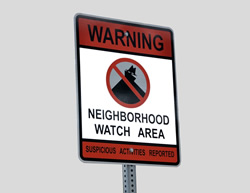Ariel Bogle* says there is concern about whether neighbourhood apps such as Nextdoor are fuelling community paranoia.
 After a thief tried to steal a neighbour’s motorcycles, Neal Kingston jumped on the app Nextdoor to let the rest of his beachside Sydney suburb know.
After a thief tried to steal a neighbour’s motorcycles, Neal Kingston jumped on the app Nextdoor to let the rest of his beachside Sydney suburb know.
“I thought my community needs to know this activity is going on,” he said.
“It demands community vigilance to stop that sort of stuff.”
The American app Nextdoor is a social media network designed for people to share information with their local community.
To sign up, users can verify their address via a code sent to them on a physical postcard.
Operating in Australia for about one year, it’s part of an emerging category of technology that links you to people in your local area, rather than with friends or colleagues.
The majority of Australians say they are not very open about their personal lives on social media, according to the ABC’s Australia Talks National Survey.
But will they be more forthcoming with their neighbours?
Nextdoor encourages the sharing of tradie tips and coffee meet-ups but it also lets users report crime or suspicious activity, raising difficult questions about safety, profiling and accountability.
“I do believe that to build stronger local communities, part of that is safety,” said Nextdoor’s Chief Executive, Sarah Friar.
“It’s not an overwhelming facet of the platform, but I think it is an important piece.”
Awareness or paranoia?
Nextdoor has the tagline “When neighbours start talking, good things happen”.
But neighbours are only human, so “good things” are not always guaranteed.
Jenn Takahashi runs a humorous Twitter account called The Best of Nextdoor from San Francisco, which crowd sources bizarre posts and altercations that take place on the platform (and is apparently not beloved by the company).
Her favourite story so far was a dispute that played out over a cannon that was set off each time the local NFL team the Seattle Seahawks scored a touchdown.
That incident reportedly escalated from the app into a brawl at the local library.
But there are also concerns that Nextdoor, and other platforms that encourage users to watch and report local crime (amid posts about lost dogs and natural disasters), risk adding to a sense of paranoia.
In fact, Ms Takahashi said she doesn’t really use Nextdoor anymore.
Nor does she still use another app called Citizen, which shares local emergency call alerts and lets users stream live video of emergencies.
Citizen isn’t operating in Australia, but it’s still accessible – offering up headlines like “man shot” in Baltimore and “man pistol-whipped” in Oakland.
Nextdoor painted a “depressing” picture of her neighbourhood, and Citizen started to make her overly conscious of danger, Ms Takahashi said, even when she’d never personally had a bad experience.
“I think that they’ve always been paranoid,” she said of some Nextdoor users.
“I think that now they have an outlet to express their paranoia.”
“Then again, maybe if they’re seeing all these different posts about suspicious activity, maybe it does make them more paranoid.”
A push for people to post ‘slowly’
If users want to share something with a “crime and safety” tag, the Nextdoor app asks them questions that resemble a police report: what was the person’s hair colour and style, for example, and their ethnicity?
Nextdoor has been accused of being a “hub” for racial profiling in the United States – an issue the company has said it’s working to address.
In Sydney, to mark the company’s push into the Australian market, Ms Friar said its “kindness reminders” were aimed at slowing people down as they post.
An automated tool detects posts that are similar to content that’s been flagged in the past and asks if users would like to rephrase it.
There are some layers of accountability built into Nextdoor, but it’s also not immediately clear who is responsible if someone misreports a crime.
If users complain about a specific post, it’s usually down to the page’s leads — local people who manage the group – to deal with it.
It can also be bumped up to Nextdoor staff to moderate.
Currently, company moderators for Australia are US-based, although that may change next year.
Ms Friar said Nextdoor encourages neighbours to take disputes offline: “That’s the moderation, I think, that needs to go on amongst communities as well, rather than Nextdoor taking a kind of ‘top down’ view.”
“We can’t really know all the ins and outs of what’s going on in a community.”
A high-tech neighbourhood watch
Professor Mark Andrejevic, who researches surveillance and digital media at Monash University, said apps like Nextdoor continue the long tradition of neighbourhood watch.
But such “peer surveillance” is increasingly shaped by available technology – social media, for example, but also cheap security cameras that we can train on each other.
A peek on my local Nextdoor, for example, revealed the use of a security camera to catch a plant thief.
Professor Andrejevic said we could internalise the logic of law enforcement and carry it out in our relationships.
“Monitoring technology trickles down from law enforcement into citizens hands,” he said.
“It’s not surprising that we would start to use them that way to catch thieves and police our neighbours.”
The debate over the ethics of neighbourhood surveillance is already advanced in the US, where controversy erupted after it emerged Amazon had partnered with hundreds of local police forces to promote its home security system, Ring.
Neal Kingston, who reported the would-be motorcycle thief in Sydney, said Nextdoor was overwhelmingly useful for practical things like getting recommendations about local cleaners and tradies.
When asked if he thought talking about robberies on the app attempted and otherwise – would make people in safe neighbourhoods overly vigilant, he said it was mostly a matter of personal experience.
“It means nothing until you’ve been broken into,” he suggested, adding, “I don’t think we should be going down the road of vigilantism.”
* Ariel Bogle is the online technology reporter in the ABC RN science unit. She tweets at @arielbogle.
This article first appeared at www.abc.net.au/news/science



